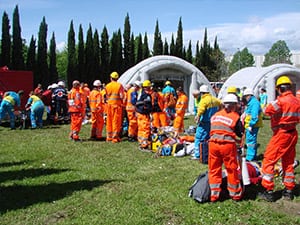The way we cope with disasters is a disaster
By Oli Usher, on 10 October 2013
A careful listener at David Alexander’s inaugural lecture, ‘Around the world in 80 disasters’ (7 October), might have been excused a hint of cognitive dissonance – his tone was consistently humourous throughout, but the thrust of his argument was no joke. The way humans deal with disasters, and the way many academics study them, he argued, is deeply misguided.
Like many researchers into disaster risk, Prof Alexander, knows the exact moment he became interested in the discipline, because it was triggered by him surviving a natural disaster. Unlike most, however, he can pinpoint it – perhaps with a little spurious accuracy – down to the nearest tenth of a second.
Not long after receiving his PhD in Geography from UCL, the young researcher was travelling on a train in Southern Italy on the evening on 23 November 1980. At 7:34pm (“and fifty-eight point two seconds”, he adds) the earth shook, the carriages swayed, and the train ground to a halt in a dark and chaotic Pompeii station. Almost 3,000 people were killed that evening, in the most deadly earthquake Europe has seen in almost a century.
Thirty-three years later, after a career in disaster risk that has taken him to Italy, the US and Switzerland, David Alexander is back at UCL.
Perhaps unusually for an academic with a background in physical geography, he is highly critical of those who concentrate on physical events as the cause of disasters. Whether a disaster is triggered by a riot, flood, earthquake or storm is far less important, he said, than what happens next. The human vulnerability which is triggered by a physical event is, for him, where the real interest lies.
Instead of focusing on physical causes, Prof Alexander pleaded for a new model, in which vulnerability is the key to understanding disasters; physical events, culture, history, economics and so on are merely contributing factors.
And this in turn means understanding that natural disasters and man-made ones are not really separate categories. In an earthquake, victims are not killed by the shaking of the ground, but by buildings falling on them – not that different from an industrial incident or a terrorist attack.
How society designs, builds, uses and maintains buildings has nothing to do with geology, and a lot to do with how we as humans put ourselves in harm’s way.
One particularly tragic way Prof Alexander outlined the human nature of vulnerability is the way women are disproportionally hit by disasters, and in particular, seem to consistently suffer more in earthquakes than men. In Pakistan, the cultural practice of purdah, which sees women confined to family homes probably plays a role, as they are more likely to be indoors when earthquakes strike; in the Indian Ocean earthquake and tsunami of 2004, women in Sri Lanka were hit worse than men, because many men were out at sea in boats which were able to ride the waves, while the women were on land, and caught in the devastating floods.
But it’s not just a third world phenomenon; even earthquakes in Japan and Italy have resulted in similar victimisation of women. In the case of the L’Aquila quake in Italy in 2019, Alexander says there is evidence that men and women reacted differently to the tremors that came in the hours before the main quake, women seeking refuge indoors while men tended to head outside. This is a classic case of how differences in vulnerability lead to different outcomes: men and women were subjected to the same physical event, yet the death toll tells a different story.
Despite this wealth of evidence that the way society interacts with hazards is hugely important, Prof Alexander argued, tackling vulnerability remains the poor relation of studying hazard in the discipline.
The situation on the ground is similarly problematic, with governments and aid agencies focusing on responding to disasters rather than building more resilient societies, in which vulnerability is reduced by improving human rights, tackling poverty, planning for disasters and training citizens and first responders.
Perhaps the problem is that vulnerability is almost intangible. Prof Alexander compares vulnerability to friction: much like friction, which only manifests itself when you actually try to move an object, vulnerability is only fully apparent during disasters.
Yet reducing vulnerability and increasing the resilience of societies is the only sensible way of reducing the impact of disasters.
Watch Professor Alexander’s mini inaugural lecture below:
Oli Usher is Communications, Marketing & Events Manager in the UCL Faculty of Mathematical and Physical Sciences.
 Close
Close



